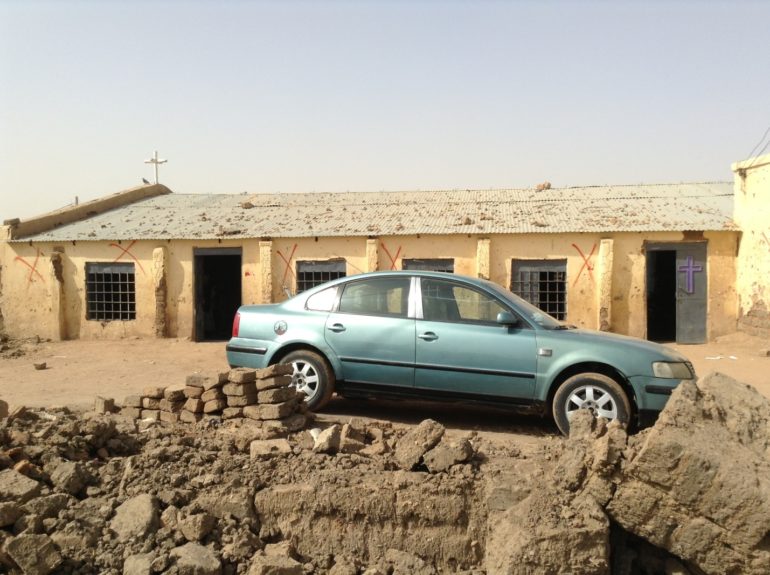
Two Sudanese church leaders have been found guilty of criminal misappropriation and trespass, following a long-running dispute over church land and property.
Rafat Samir, chairman of the Lands and Buildings Committee of the Sudan Presbyterian Evangelical Church (SPEC), and Daniel William, the deputy chairman, were each fined 5,000 Sudanese pounds (approximately US$750) by a court in Khartoum on 30 October. Christian Solidarity Worldwide called their conviction and the punishment “unjust”.
The conflict originates in a dispute between SPEC and the Ministry of Guidance and Endowments, which in 2013 authorised and charged an illegally convened land and buildings committee with the administration of the SPEC’s church property.
Church leaders say this government-backed committee has been interfering with internal church matters and involved in selling off property to investors.
Fraud
Rafat Samir, who was appointed chair of the Church Council in 2012, was first arrested in April 2016 following allegations by his predecessor of trespassing, criminal possession and illegally impersonating the chair of the Council – a role his predecessor, Hamad Muhammad Salah, claims still belongs to him.
Salah was dismissed from the role in 2012 for fraud, but the government reinstated him, even though it had no legal authority to do so.
Since his reinstatement, Salah has sold off church property to businessmen with links to the government, even though last year an administrative court in Sudan ruled that Samir, not Salah, is the legal chair of the Council.
Several members of SPEC have been detained or assaulted after peacefully protesting at the selling off or demolition of their buildings, including their homes.
On 26 April police and an armed mob occupied part of the SPEC compound in Omdurman. It was the same location where, earlier that month, two church members were stabbed during a protest against appropriation of a school there.
Sound pollution
Meanwhile five leaders of the Sudanese Church of Christ (SCOC), who were charged with sound pollution, have had their case postponed until mid-November.
The US-government funded Arabic television channel Alhurra covered the news of their court appearance in Omdurman on 31 October.(You can watch the report below. If subtitles don’t automatically appear, click ‘CC’ at the bottom-right of the video).
Their case was postponed because of the absence of the prosecutor. The pastors’ lawyer, Dimas James, said the court had said the case would be dropped “on the condition that the five accused priests should not re-commit the [crime of] ‘general disturbance’”.
Ayouba Telyan, president of the SCOC and one of the men charged, said he “strongly rejected” the order “to pray under pressure, and according to state decisions. There is no law in the world that forces prayers to be prayed according to a government’s point of view”.
‘Confusion and suffering’
The pressure on Sudanese churches has increased in recent years.
In an exclusive interview in mid-June, Mariam Ibrahim, who was condemned to death for her Christian faith in Sudan in 2014, told World Watch Monitor the “Sudanese government says it respects freedom of religion, but it does not”.
The SCOC in May wrote an open letterto the Khartoum government protesting “the systematic violation of Christian religious freedoms”.
They referred to the “hard conditions” they have faced in recent years, including the demolition of churches, confiscation of church property, government failure to allocate land for construction of any new churches, and travel restrictions on senior church leaders.
The EU Special Envoy for Freedom of Religion or Belief, Ján Figeľ, raised the issue of church demolitions in March during a visit to Sudan and was told some of the demolitions had been temporarily stopped.
In a letter to the new Minister of Religious Endowments, Figeľ wrote in May: “I am sure you would agree with me that these events generate tensions and go counter [to] the many efforts deployed by Sudan to preserve its capital of religious diversity.
“Regarding the ongoing confiscations of religious properties from Evangelical churches, I cordially encourage you in your new important assignment to ensure your Government’s full protection of the rightful legal church committees, as recognised by the respective religious leaders and the Supreme Court of the Republic of the Sudan. The past practice of appointing alternative committees has brought only confusion and suffering to the religious communities.”